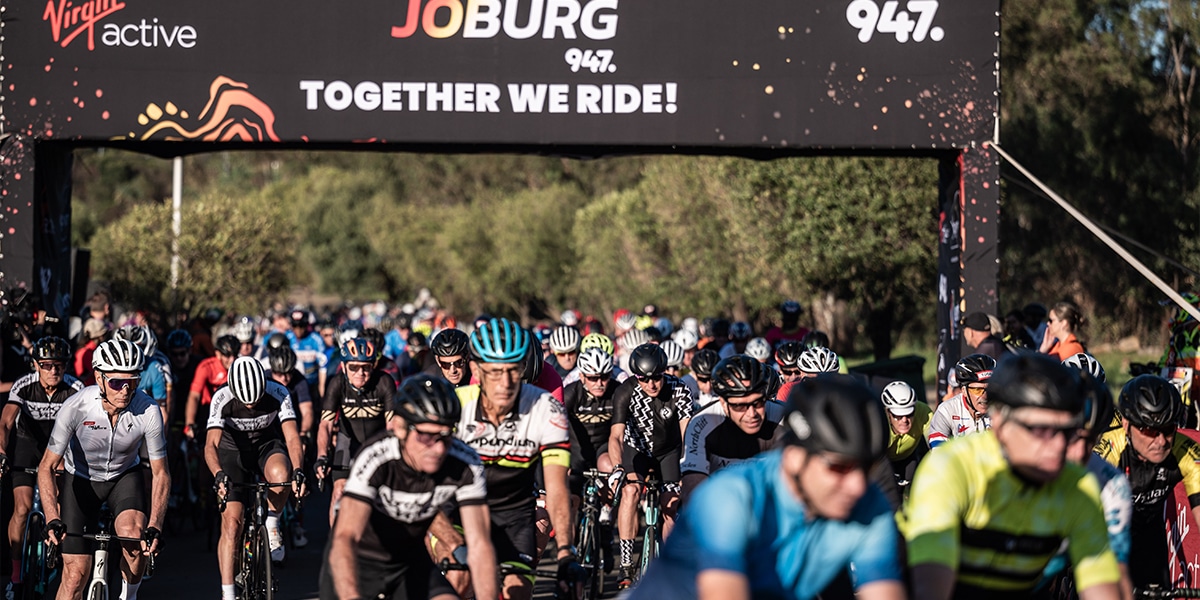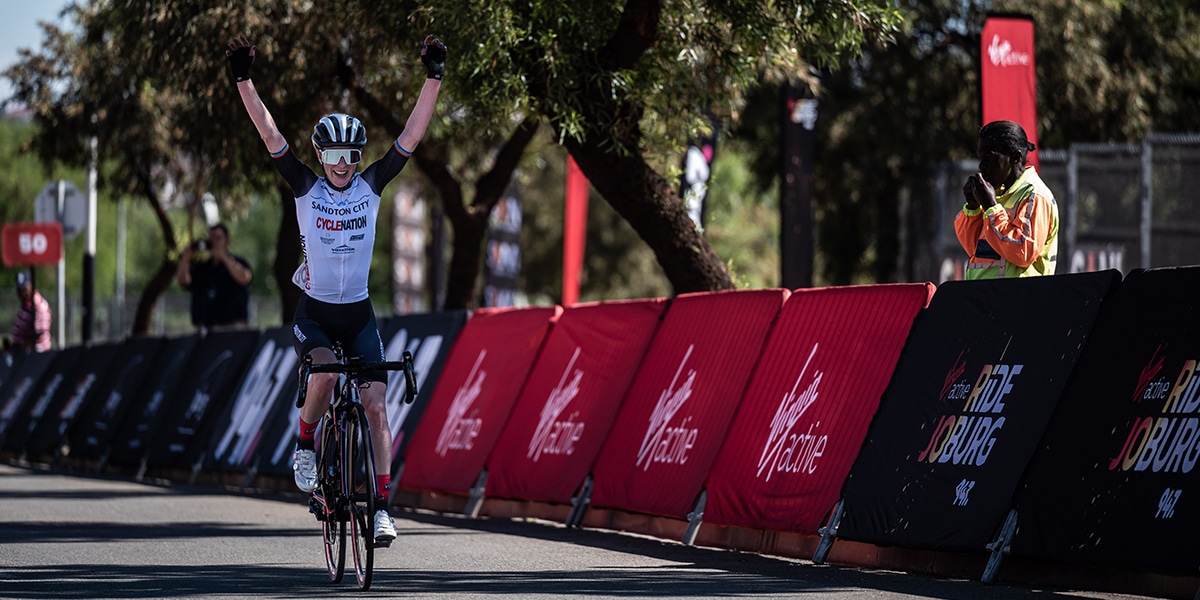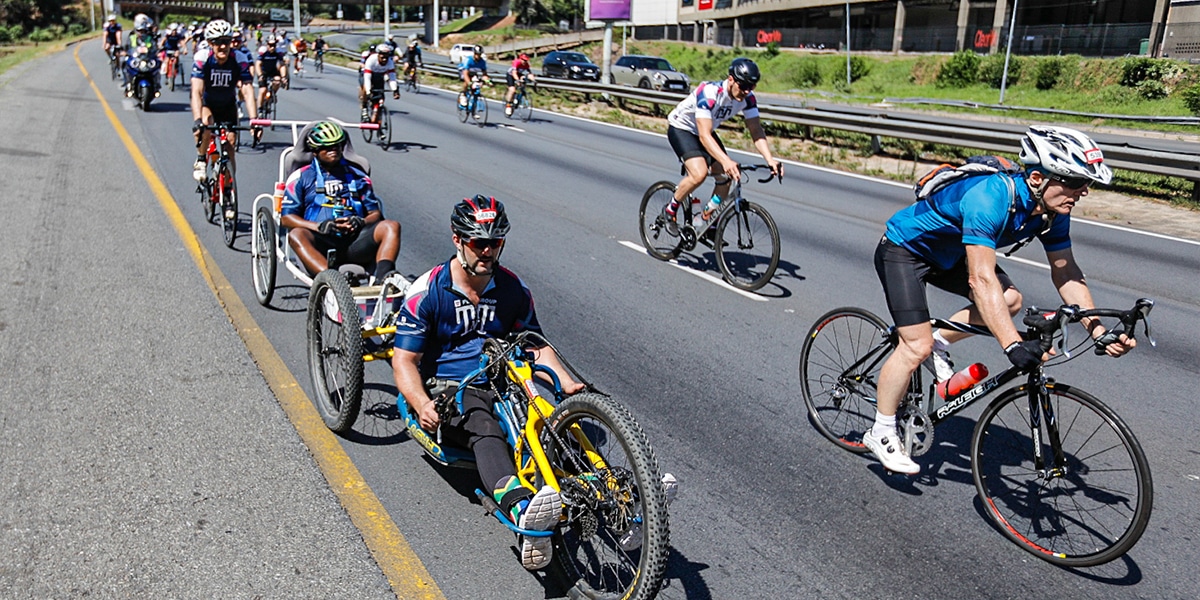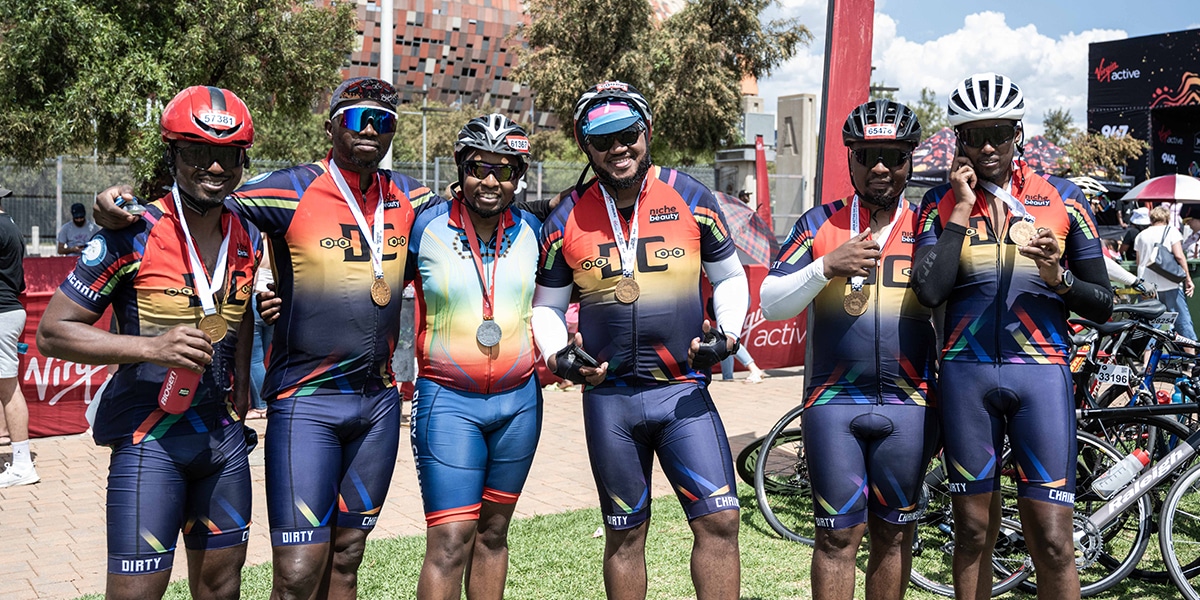
By Dr Adrian Rotunno
Preparing for your first Virgin Active 947 Ride Joburg cycle race can be both exciting and challenging. Here are some expert tips and tricks to help you make the most of the experience:
1. Plan a solid training schedule by creating a structured training plan
- This should include a mixture of long rides, recovery days, and shorter, high-intensity workouts.
- Aim for consistency in your training to develop the necessary endurance for a 100km race.
- A good example of a structured training schedule to follow would be the Virgin Active 14-week training plan. So, join a Virgin Active gym near you today.
2. A solid fitness base is necessary
- Focus on building a strong foundation of fitness through consistent training rides.
- Gradually increase your training load (intensity x volume) so that you incorporate endurance/interval training, and mileage to improve your endurance, power output and speed. This is all important to ensure you can comfortably cover the 100km.
3. Adequate fuelling and hydration
- Proper levels of energy and hydration are both crucial for endurance events.
- Plan your nutrition strategy, including pre-race meals, on-bike snacks, and hydration.
- Hydration on not only water, but also different forms of liquid carbohydrates and electrolytes.
- It’s very important that you experiment with different options during training to find what formula works best for you.
4. Pace yourself
- It’s always better to avoid the temptation to go all out at the beginning of the race.
- Rather find a comfortable rhythm throughout the race, and finish faster if you have something extra in the tank.
- Conserving energy early on will benefit you in the later stages when fatigue sets in.
5. Get into group rides
- Try to find a similar level group, bunch of mates or a regular peloton to ride with in your training build up, and in the race itself.
- Riding in a group in training provides skills in how to safe ride in large groups.
- For the race, staying in the bunch provides drafting opportunities, energy conservation, and creates a sense of oneness as everyone ‘suffers’ or ‘triumphs’ through the challenge.

This next point ties in with the above. Try to constantly improve your bike handling skills, especially when it comes to cornering, descending, and riding near others in the bunch. Learn from your more experienced friends or group rides, and never be afraid to ask questions on how to handle specific race situations. This will build confidence and help get you through the race course safely and comfortably.
6. Bike fit and equipment safety
- Make sure that your bike is properly fitted to your body.
- An incorrect bike fit can cause discomfort, impact your performance, and result in acute/chronic injuries.
- Consider getting a professional bike fit to avoid these problems. Let your local bike shop mechanic work their magic by getting them to service your bike and check your equipment.
- This includes frame integrity, brakes, tires, and gears. They will ensure everything is in good and safe working order.
7. Mental preparation is as important as physical training
- Maintain a positive mindset, set achievable goals, and stay focused throughout the race.
- Divide the distance into smaller milestones to make it more mentally manageable.
8. Enjoy the moment
- Remember the whole reason why you’re doing this – it’s to enjoy the race and the journey leading up to it. Embrace the challenge, appreciate the scenery, soak up the camaraderie, and celebrate your accomplishment at the finish line.

A nutrition approach for the new cyclist attempting their first Virgin Active 947 Ride Joburg cycle race:
1. Train your gut for the race
- Just like the physical training, you need to do nutrition training as well.
- This means developing a nutrition plan that best works for you, and to achieve this, it can best be done in your training build up to the race.
- As you start to gradually increase training load, so should your nutrition strategy be concurrently built.
- This allows you to figure the most appropriate plan for your specific needs. If in doubt, always best to ask a nutritionist for advice.
2. 2-3 days before the race
- The old saying of ‘carbo-loading’ the night before still rings true to some degree.
- However, its best to gradually build your glycogen stores (energy supplies in the liver and skeletal muscle) over the 2-3 days before the race, rather than wolfing down a huge carbohydrate portion the night before.
- This can lead to poor sleep, indigestion and abdominal discomfort the night before the race.
3. Pre-race meal
- Eat a balanced meal 2-3 hours before the race.
- This should include carbohydrates for energy, such as whole grains, fruits, and vegetables.
- Include a moderate amount of lean protein and healthy fats for sustained energy. Avoid rich, heavy or unfamiliar foods that may cause digestive problems.
4. Hydration
- Start hydrating well before the race.
- Aim to drink water, carbohydrate and electrolyte-rich beverages throughout the day leading up to the event.
- Remember, you are still ‘gut-training’ in the days before.
- During the race, aim to drink 500-750ml of fluids per hour, depending on weather conditions and personal needs.
- This should be a combination of water, carbohydrates and electrolytes.
- Remember, it is possible to over or under-hydrate, which can lead to serious medical problems.
- If in doubt, seek guidance from a sports nutritionist on fluid management strategies.
5. During the race
- Eat easily digestible carbohydrates during the race to maintain energy levels.
- It’s best to carry a combination of energy gels, energy bars, solid food, water and carbohydrate drinks.
- The more easily digestible gels and liquids will provide a quick source of fuel, whilst the solid foods will do for sustained fuel provision.
- Aim to consume around 30-60 grams of carbohydrates per hour.
- Experiment during training rides to find what works best for you.
6. Electrolytes
- Replace electrolytes lost through sweat to maintain healthy muscle function.
- There are a variety of carbohydrate/electrolyte sports drinks and electrolyte tablets on the market.
- Find what works best for you, and take appropriately during the race, especially if it’s a hot and humid day.
- Electrolyte-rich snacks like bananas or salty snacks can also help.
7. Snacks
- Pack small, easily accessible snacks such as energy bars, bananas, baby potatoes, or trail mix.
- These can provide a quick boost of energy when needed during the race, and provide a different option for the sugary-sweet, overloaded palate.
- Aim to consume them strategically, such as during rest stops or on flatter sections of the course when it’s easier to safely access them.
8. Post-race recovery
- Remember you need to recover after a long-distance event.
- You’ll need to replenish your body with a combination of carbohydrates and protein to aid in muscle recovery.
- The ‘golden hour’ as it’s commonly termed, is the first 30-60 minutes after finishing.
- This is when your body is in a highly absorptive state, so make sure you consume a snack or meal that includes both these macronutrients. This can be a protein shake, chocolate milk, or a balanced meal.
9. Listen to your body
- Pay attention to your body’s signals during the race. If you feel hungry, fatigued, or thirsty, its likely you’ve missed the fuelling window, and could be behind on nutritional needs.
- This is when the dreaded ‘bonk’ or ‘hunger flat’ occurs.
- Bottom line, don’t wait for thirst or hunger, rathe adopt a routine of regular eating and drinking on the bike, even if you don’t feel it necessary.
- Everyone’s nutritional needs can vary, so remember to adjust your intake based on how you feel and perform during training rides.
It’s essential to practice your nutrition plan during training rides to ensure it works well for you. Everyone’s dietary needs and preferences are different, so find what suits you best and stick to it on race day.

A mental checklist for the new cyclist attempting their first Virgin Active 947 Ride Joburg cycle race:
1. Set realistic achievable goals
- Understand that your first 94.7km cycling race is a challenge, and it’s normal to experience a range of emotions.
- Set realistic expectations for yourself, focusing on completing the race rather than achieving a specific time or position in the bunch.
2. Focus on the now
- Don’t get overwhelmed by the task at hand, divide the race into smaller segments or specific checkpoints.
- Concentrate on one segment at a time, giving your full attention to the current moment.
- This approach helps manage anxiety and keeps you focused on an achievable step-by-step manner.
- Remember that cycling is not just about the destination but also about the journey.
- Enjoy the training build, the social aspect with fellow cyclists, and the thrill of participating in a race.
- Embrace the joy of cycling and appreciate the thrill of it.
3. Positive affirmation
- Develop a one or a few positive self-affirmation mantras and use them during training rides and on race day.
- Replace negative thoughts or self-doubt with positive and encouraging statements.
- Remind yourself of your abilities, strength, and resilience. You’ve got this.
4. Picture your own success
- Use visualisation techniques to imagine yourself successfully completing the race.
- Visualise the course, visualise your movements and technique, and envision yourself crossing the finish line with a sense of accomplishment.
- This positive mental imagery can boost confidence and motivation.
- Raise those arms mentally…and then again physically when you cross that finish line.
5. Mindfulness and self-care
- Try to incorporate mindfulness techniques into your training and race day.
- Pay attention to your breathing, body sensations, and the environment around you.
- By staying present and aware, you can reduce stress, improve concentration, and enhance performance.
- Prioritise self-care leading up to the race.
- Get good quality sleep, eat a balanced diet, and engage in activities that help you relax and unwind.
- Spend time with family & friends, or your riding group in a social ‘off-bike’ setting.
- Taking care of your physical and mental well-being will bring much needed positive mindset on race day.
6. Ask for help
- If in doubt about anything, don’t shy away from asking for help.
- This can be from friends, family, or fellow cyclists who have experienced similar challenges.
- Share your feelings, concerns, and excitement with others who can provide encouragement, advice, and specific perspective.
7. Embrace your challenge
- Try not to view the race as a scary wall of a task, rather see it as an exciting opportunity for personal growth and achievement.
- Embrace the challenges that come with an endurance sport like cycling and see them as opportunities to push your limits and learn a whole heap about yourself.
- Doing hard things allows for self-progress.
8. Acknowledge and celebrate your achievements
- Appreciate how far you’ve come over the last few months.
- All the training and the milestones you’ve reached and will reach during the race.
- Celebrating these accomplishments will boost your confidence and self-worth, as well as that comforting feeling of being with like-minded individuals going through the same challenge.

The do’s and don’ts for the new cyclist attempting their first Virgin Active 947 Ride Joburg cycle race:
Do’s:
- Have a well-structured training schedule that includes a mix of long rides, recovery days, and high-intensity workouts.
- Train consistently and gradually increase your mileage to build endurance.
- Practice proper nutrition and hydration strategies during training and on race day.
- Ensure your bike is properly fitted to your body and that all equipment is in safe working order.
- Improve and practice your bike handling skills, especially in cornering, descending, and riding near others.
- Pace yourself and find a comfortable rhythm during the race.
- Ride in a group or peloton for drafting and energy conservation.
- Stay mentally focused, maintain a positive mindset, and set achievable goals.
- Enjoy the experience, appreciate the journey, and celebrate your accomplishment.
Don’ts:
- Overtrain or push yourself too hard, as it can lead to injury, burnout, and loss of interest in your goals.
- Neglect proper nutrition and hydration, as it can greatly affect your performance and endurance.
- Start the race at an unsustainable pace. Avoid going all out in the beginning and conserve energy for later in the race.
- Isolate yourself during the race. Try to ride in a similar level group or find mates to share the experience with.
- Do last minute to check your bike and equipment. Make everything is in good working condition well before race day.
- Forget to practice bike handling skills. Improving your technique will help you navigate the race course safely and comfortably.
- Allow negative thoughts or doubts creep in. Stay positive and mentally focused.
- Forget to appreciate the journey and the accomplishment of completing your first 94.7km race.
Remember, completing your first VA 94.7km cycling race is a significant achievement. With proper training, preparation, and a positive mindset, you can make it a memorable and rewarding experience. Good luck! Reach your ultimate readiness for the race with Virgin Active. Join a Virgin Active gym near you today.
